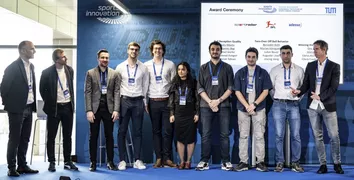In recent years, data analysis has gained significant importance in professional sports. Modern tracking systems can seamlessly capture movements of players. However, the raw data alone provide relatively few insights – the challenge lies in developing intelligent analytical methods that can create real value for training and competition.
As part of the SportsInnovation 2024, one of the world's leading trade fairs in the sports technology industry held in Düsseldorf from March 20th to 21st, three teams of TUM students presented the results of their projects, which they had previously worked on as part of TUM's 1st Football Analytics Hackathon. The students investigated questions related to game analysis in professional football. The trade fair took place within the framework of the inaugural "Science Tracks," where the Massachusetts Institute of Technology (MIT), FIFA, and TUM presented innovations in sports data analysis to industry professionals.
Prof. Dr. Daniel Link (Chair of Performance Analysis and Sports Informatics), who initiated and conducted the project, explained: "Our students have achieved excellent results as part of the course, and we are delighted to have the opportunity to present these at SportsInnovation 2024."
Pressing, ball control, or runs behind the defensive lines – project ideas encompassed many exciting questions from the world of soccer. The topics are of interest to both sports science and computer science. "The general problem lies in the classification of movements of multiple autonomous agents, which is found in many scenarios where human movement trajectories are present, such as evacuation research, traffic planning, and autonomous driving. Elite sports are an extremely interesting field of application for data science," said Prof. Link. "Here, human behavior in a natural, highly competitive, yet complex-reduced space defined by rules can be examined."
Prior to the trade fair, TUM MDSI Football Analytics Hackathon took place in January at the Munich Data Science Institute
The winning teams qualified for the event through the hackathon in January. "During the hackathon, students from various disciplines worked together on challenges," said Prof. Link. "Our TUM students not only learnt to apply their expertise to practical problems but also to collaborate efficiently in heterogeneous working groups."
The event was organized and conducted as part of the TUM Project Week at the Munich Data Science Institute (MDSI) in Garching, which focuses on machine learning and artificial intelligence methods. Dr. Drew Behrens and Vasiliki Sdralia, both project managers at MDSI, provided significant support for this.
The event was planned in close collaboration with the German Football League. "As a league, we are interested in ensuring that our clubs make the best possible use of match data and can generate competitive advantages. With TUM, we have a strong scientific partner that provides the foundation and innovative ideas for future practical applications," explained Dr. Hendrik Weber, Director of Technology and Innovation at DFL.
To the homepage of the Chair of Performance Analysis and Sports Informatics
To the homepage of the Munich Data Science Institute
To the video documentation of the hackathon
To the news article of the cooperation partner DFL
Contact:
Prof. Dr. Daniel Link
Chair of Performance Analysis and Sports Informatics
Munich Data Science Institute
Georg-Brauchle-Ring 60/62
80992 München
Telefon: 089 289 24498
E-Mail: Daniel.Link(at)tum.de
Dr. Drew Behrens, Vasiliki Sdralia
Munich Data Science Institute
85748 Garching
Telefon: 089 289 52356
E-Mail: drew.behrens(at)tum.de & vasiliki.sdralia(at)tum.de
Text: Bastian Daneyko
Photo: Sebastian Widmann/Bundesliga
